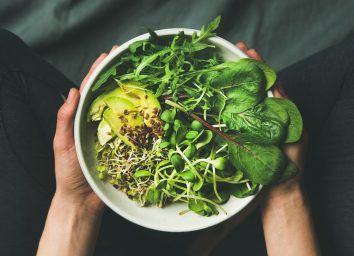Everything You Need to Know About the Blood Type Diet

Do you know your blood type? This piece of personal medical info may be important for determining what type of transfusion you could get during a surgery, or who can receive blood you might donate. However, can it also determine the best way for you to eat? That's the premise of the popular Blood Type Diet.
The well-known diet is one of the more unique eating plans you can follow, but it's not as rooted in evidence as you may believe. Let's take a deeper dive into what the blood type diet is, what you can (and can't) eat on the diet, if it works, and whether experts recommend it.
What is the blood type diet?
First proposed in 1996 by naturopathic doctor Peter D'Adamo in his book Eat Right 4 Your Type, the Blood Type Diet holds that the four blood types O, A, B, and AB are the key to personalized nutrition.
According to D'Adamo, twenty-first-century eating should mirror the dietary habits of our ancestors, as defined by blood type. The diet also claims that people with different blood types don't process food and nutrients the same way, and therefore should eat differently. Hardcore proponents believe that your blood type can affect certain medical risks and even personality traits.
What foods are allowed on the blood type diet, according to your blood type?
In his book, D'Adamo characterizes the four types by their place in history: O is for Old, A is for Agrarian, B is for Balance, and AB is for Modern. Each type comes with dietary recommendations based on these bloodline beginnings. If you follow the blood type diet, here's what you can expect to eat.
Blood Type O Diet: Because O is the oldest blood type on Earth, people with this blood type are instructed to follow an eating plan similar to the Paleo or "caveman" diet. A hunter-gatherer mix of meat, fish, vegetables, and fruits is best, goes the theory. Type Os should avoid wheat, corn, dairy, and certain legumes like lentils and kidney beans.
Blood Type A Diet: As "agrarians," people with type A blood are encouraged to eat a mostly plant-based diet. Tofu, vegetables, grains, legumes, seafood, and turkey all make the cut for this type. Red meat, dairy, and corn, however, are out.
Blood Type B Diet: Called "balanced omnivores," people with type B blood have a nomadic heritage, says D'Adamo. Their diet has the most variety of the four types and can include meat (except for chicken), seafood, dairy, grains, and beans (except for lentils).
Blood Type AB Diet: Because the AB blood type evolved as a result of genetic intermingling, people with this type are theoretically more vulnerable to disease. A diet of lamb, fish, dairy, and plants (and no corn, chicken, kidney beans, or buckwheat) is intended to boost immunity.
RELATED: Your guide to the anti-inflammatory diet that heals your gut, slows the signs of aging, and helps you lose weight.
Does eating for your blood type actually work?
With the groundwork laid, you may be wondering: is the blood type diet actually worth following? While it's certainly an intriguing concept, according to the latest research, there's no evidence that blood type is a valid determiner of diet. In fact, a 2014 study soundly debunked the theory.
When researchers tested the diet's hypothesis, they discovered that improvements or setbacks in physical measures like insulin, cholesterol, and triglyceride levels had nothing to do with blood type, even when people closely followed the prescribed diet for their type. "There is evidence that our blood type can be linked to certain risks for diseases, but there is no evidence that our blood type is linked to the best diets for us," says registered dietitian Carrie Gabriel, MS, RDN.
Would experts recommend the blood type diet?
Besides being rather unscientific, the blood type diet may be difficult to follow or socially isolating. A detailed list of permissible and non-permissible foods can make grocery shopping, meal prep, and dining out a challenge.
"It can also be complicated if it asks that you eat things that you normally don't, that are out of your price range, or perhaps not common for you," says Gabriel. "For example, if your blood type says you need more meat and you are a vegetarian, that can be complicated, and you may or may not be willing to change your diet for this reason."
On the other hand, the diet's emphasis on whole foods like fruits, vegetables, and lean meats may be a positive for many people.
"The main benefit of any blood type diet is that they encourage eating healthy, whole, unprocessed foods versus junk, which is probably going to help your health regardless," Gabriel says.
Ultimately, the underlying reasons humans have blood types at all is still something of a mystery to scientists. But whatever the purpose of our As, Bs, and Os, it probably isn't to tell us how to eat.
So before you follow this fad, ask yourself your reasons for wanting to try it. Then consult a dietitian or other medical professional about the best way to reach your goals.








